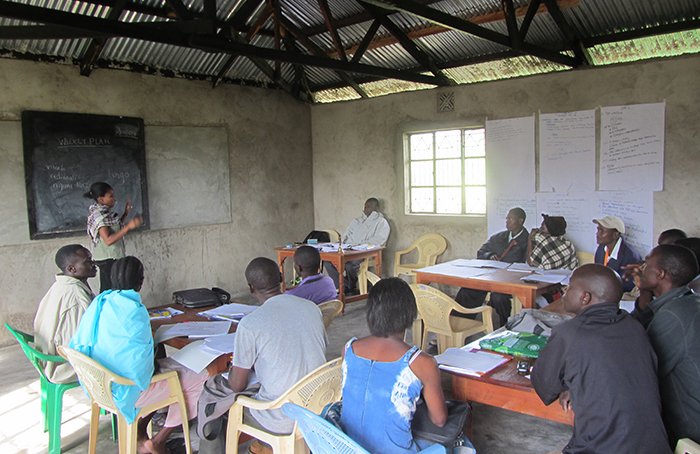Feature photo: Nuru Kenya Education Facilitator Wang’enyi Conslata Babere leading a training on project management for newly hired field officers.
This week in Addis Ababa, Ethiopia, key stakeholders, government officials and development experts are meeting for a ground-breaking summit to discuss funding strategies for the Sustainable Development Goals (SDGs).
In 2014, in an effort to consolidate the gains made under the Millennium Development Goals (MDGs), the UN proposed an ambitious set of 17 new post-2015 targets, which came to be known as the Sustainable Development Goals. The SDGs, like their predecessors, are far-reaching in their scope and have gained support from a diverse group of dedicated international development professionals. The proposed SDGs are composed of 17 key deliverables that the UN and its partners hope will be achieved by 2030. Prominent among these are: ending hunger; ensuring inclusive and equitable quality education for all; ensuring healthy lives at all ages; and ending poverty in all forms.
During these and subsequent meetings, it is my hope that the working groups developing the SDGs strategy delve into another key sustainability component, one that cuts across all development sectors to create strong cross-sectoral innovations: investing in local leaders, local staff and local experts to understand the needs in their communities and create local solutions to address those needs. Leadership is the unifying force that could create strong synergies across such diverse 2030 deliverables.
In Migori County, where Nuru Kenya has been working since 2008, there has already been a dramatic transformation towards achieving some of these SDGs – with over 78,000 individuals lifting themselves out of extreme poverty. In fact, Nuru Kenya has improved crop yields for farmers; trained households on the importance of saving so that they are better prepared for potential economic shocks; improved the percentage of students achieving Standard 2 literacy; and trained households on the importance of understanding 10 healthy behaviors. These accomplishments echo some of the successes of the MDGs and some of the early aspirations of the SDGs.
However, Nuru Kenya’s impact at the farmer household level cannot be attributed to program design and implementation alone. Over the last 7 years, Nuru Kenya has been driving (and sustaining) its own impact through an extremely powerful sustainability engine – local leaders, local staff and local experts. The program activities that led to this transformation were developed by local leaders who were intimately involved in the day-to-day fight against extreme poverty.
Leaders like Nuru Kenya Country Director Pauline Wambeti, whose vision and leadership acumen have taken Nuru Kenya from a development start-up to one of the most inspiring companies to work for in East Africa. Leaders like Francis Kizito, whose dedication to his work has helped empower the households in his community to lift themselves out of extreme poverty. Leaders like Paul Mogosi and Bennadatte Mugita, who after developing an action plan for district scaling, have been able to complete the first locally-led district scaling in Nuru Kenya’s history. Leaders like Jane Auma, who has developed a robust and comprehensive Leadership curriculum that capacity-builds and empowers leaders on the valuable skills needed to impact their community. The incredible impact Nuru Kenya has had on those living in extreme poverty could not have been possible without the tireless efforts of these local leaders.
As governments, NGOs, international governing bodies and other prominent stakeholders conclude their discussions in Addis and shift their focus from the MDGs to the SDGs of 2030, a shift must also be made towards recognizing the importance of more leadership empowerment at the local level. The ambitious SDGs can only be fully realized with strong, passionate, dedicated leaders implementing changes on the ground. As we as the international development community begin to look forward to the 2030 SDGs, we have to ask ourselves: Are we doing everything we can to empower local leaders? Are these 2030 goals achievable without strong ownership at the local level? The laudable efforts of these diverse stakeholders in creating the SDGs is bound to revolutionize how we fight extreme poverty, but without empowering local leaders to drive this change on the ground, we may fall short of our goals.
For everyone who is passionate about ending extreme poverty – from development professionals to business leaders to committed volunteers – it is important that we to continue to change our perceptions of what is possible, what will work, and who will be responsible. Let’s work collaboratively and collectively to ensure the successful achievement of the SDGs. More importantly, let’s push our resources towards empowering local leaders to become true change agents in their communities so that by 2030 we can truly win the fight against extreme poverty.


